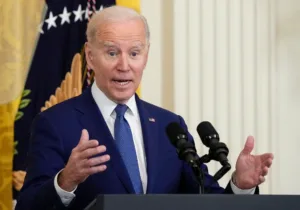Epoch-making shifts in foreign affairs are often historically accompanied by alterations in the foreign policy of the powers that are involved. Those changes can be rapid, as they were when the Dutch and English made amends after their 17th-century wars, or they can be slower, as with the growing recognition of the German threat in the British Foreign Office in the late 19th and early 20th centuries. In the former case, the English Parliament replaced their King with a Dutch monarch and forever changed its relationship with the Netherlands. In the latter, the sustained bureaucratic campaign of Sir Charles Hardinge broke a staid diplomatic consensus and reoriented British policy to face the biggest challenge of its time. These (more or less) dramatic shifts in foreign policy recur throughout diplomatic history, and the United States is no exception.
The Obama administration, for example, saw a sea change in the theory and practice of American foreign policy, though not for the best. The president’s soaring rhetoric, promising to make amends for the ‘ills’ of the American past, captured the hearts and minds of both the media and the State Department. Obama’s foreign policy doctrine, characterized by some as “leading from behind,” and attempts to foster a multipolar world with a smaller, more circumspect American role tickled the fancies of career diplomats who chafed under the more interventionist Bush administration. This new liberal foreign policy consensus deified cooperation among even the most adversarial nations, promoted contrition over America’s role on the world stage and sought to remake the world order to the detriment of American national interests.
Under the Trump administration, portrayed (not inaccurately) as Obama’s antithesis, this liberal consensus only became further entrenched in the bureaucracy and media as exemplified by the #Resistance movement. In 2021, many #Resisters rejoiced when the new administration hired many Obama alumni and proponents of this liberal consensus, including Secretary of State Antony Blinken and National Security Advisor Jake Sullivan. The Biden team has doubled down on the Obama approach, pushing multipolarity and American meekness abroad despite the previous failures of that strategy, the Trump foreign policy interregnum, and the fact that world events have dramatically changed course. A lot has happened since 2016: our adversaries have been emboldened, our alliances disrupted, and our world position weakened. America’s foes undermine our interests across the globe, yet the Biden administration only sees mere competitors or, in some cases, potential friends.
These attitudes about American interests and our broader involvement overseas – namely the excessive deference to other nations’ interests and the overwrought self-effacement with respect to American power – are deeply entrenched in the liberal movement, the Democratic Party, and their fellow travelers in the federal government. The ideas that underlie this liberal foreign policy consensus emanated from the post Cold War era when American optimism and political naiveté were at their zenith. Scholars, politicians, and writers thought we had reached the end of history and that liberal democratic capitalism had permanently defeated any ideological rivals. The complacency that such an idea fostered led to a decline in the salience of America’s national interests. After all, these were merely provincial concerns compared to the needs of the so-called global community.
This fatally flawed approach has been embraced by the Biden administration. International cooperation with nations that do not share our values or interests is prioritized ever higher while allies like Israel, Poland, and Saudi Arabia are ignored. Brazil, under its new left-wing leader Lula, has been fêted by the Biden team as a democratic ally against authoritarianism – just as it welcomed tighter links to Venezuela, Iran, and Russia. Iran, in spite of its nuclear proliferation and its increased regional support for terrorism, has been negotiating a sweetheart nuclear deal with the United States since January 2021. Even after its direct military support of Russia’s war in Ukraine, the negotiations keep coming. Now, the administration is foolishly seeking a diplomatic thaw with China, ignoring the constant drumbeat of Chinese aggression in order to achieve a meaningless summit in which the US looks desperate. The ideas which have characterized the decades-old liberal international consensus are fundamentally out of touch with the reality of great power conflict and the increasing alignment of our global rivals.
How can we steer the ship of state away from these dangerous shoals and into a new channel which foregrounds American interests and accepts the new geopolitical situation? In this, history may be a guide – but it’s not the American past that serves as an example.
The most salient case of a hegemonic power radically turning the ship of state against entrenched opposition comes just over a century ago, in the British Foreign Office’s shift to recognize and counter the threat of the German Empire. In the decades prior to 1905, the generation of diplomats that came of age in the period between the Crimean War and the 1870s largely ran the show in the Foreign Office. Due to their experience and viewpoint, they almost universally saw the budding alliance of France and Russia – especially in the colonial theater – as the greatest danger to British global interests. France, smarting from the loss of Alsace and Lorraine after the Franco-Prussian War, was intent on gaining imperial footholds across Asia and Africa, often seeking to overturn informal British suzerainty. Russia was rapidly gobbling up territories in Central Asia – on the crucial road to India – and looking to gain informal control of the Balkans and the key straits which control access from the Black Sea to the Mediterranean. It made perfect sense for these career diplomats to see these as the primary challenges to the British Empire – until it didn’t.
That turning point in world geopolitics can be debated by historians endlessly; one could place it anytime from Bismarck’s diplomatic blackmail in the 1880s through the increasing antagonism of the 1890s and the naval race of the 1900s. Regardless, what matters is that such a point was indeed reached where Germany surpassed Russia and France to become the greatest danger to British imperialism. The old guard of the Foreign Office establishment, in thrall to its outdated ideas of foreign affairs, simply could not perceive Germany as a foe. They constantly pushed for an alliance between the powers, even when Berlin was intransigent in its outsized demands and meddled in British interests abroad. What was needed was a new generation of foreign policy hands, one which could be clear-eyed about the true nature of the German challenge. Enter the Edwardians.
This group of up-and-comers was less steeped in the mid-Victorian rivalries with the French and Russians and, as such, could see the geopolitical reality for what it was in the moment. The entrenched bureaucracy made a much-needed perspective shift difficult, but this resistance was overcome by an internal champion: Sir Charles Hardinge. Hardinge, an ardent skeptic of Germany and Permanent Under-Secretary for Foreign Affairs, was able to promote like-minded men to key bureaucratic jobs. According to the historian T.G. Otte, this relative youth movement in the diplomatic cohort held “hatred of Germany as an article of faith.” Acting as a catalyst to bring this new generation, including key analysts like Sir Eyre Crowe, to the forefront of the Foreign Office, Hardinge ensured that the Empire would shift in an anti-German direction. And it happened none too soon, as Britain was able to turn the ship of state in time to prepare for what became an existential contest. Without the efforts of men like Hardinge and Crowe to reorient British foreign policy, the outcome of the Great War could have been very different indeed.
The United States in 2023 needs to learn the lessons taught by our Edwardian forebears – and quickly. We need our own version of Hardinge, who will find and promote young talent in the permanent bureaucracy who recognize the threats to American hegemony better than the entrenched liberal consensus. In 1907, Eyre Crowe wrote the seminal memo in pre-World War I British foreign policy history, laying out the case against Germany in stark, realistic terms:
On this view of the case, it would have to be assumed that Germany is deliberately following a policy that is essentially opposed to vital British interests, and that an armed conflict cannot in the long run be averted, except by England either sacrificing those interests, with the result that she would lose her position as an independent Great Power, or making herself too strong to give Germany the chance of succeeding in a war. This is the opinion of those who, see in the whole, trend of Germany’s policy conclusive evidence that she is consciously aiming at the establishment of a German hegemony, at first in Europe, and eventually in the world.
Where is this sort of trenchant analysis in the State Department vis-á-vis America’s very similar global challenges? The staid, outdated attitude of the liberal consensus must be replaced with a laser focus on national interests and a willingness to grapple with the reality of great power conflict. We need to leave the Obamaite fantasies of international comity in the past and reorient ourselves to what is actually happening geopolitically. Those in the permanent bureaucracy have a critical role in shaping and directing American foreign policy; they need a helmsman who can make the bold choice to steer into new waters. The ship of state may have a terrible turning radius, but given the right crew, it will indeed shift course.






 Sponsor a student for Christianity & National Security 2024
Sponsor a student for Christianity & National Security 2024